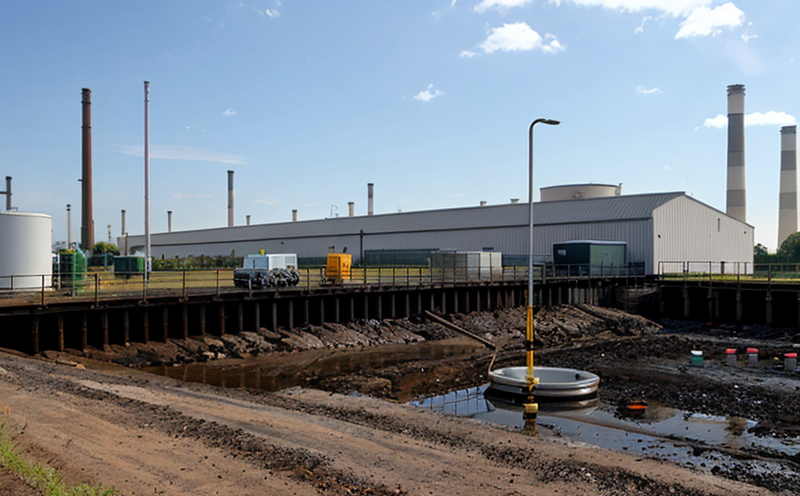ISO 14067 Carbon Footprint Monitoring Test in Industrial Operations
The ISO 14067 standard provides a framework for quantifying and communicating the carbon footprint of products. This service specializes in monitoring and testing carbon footprints within industrial operations, ensuring compliance with international standards and supporting sustainability initiatives.
In an era where environmental stewardship is paramount, understanding and managing carbon emissions is critical. Industrial sites, especially those involved in manufacturing processes or energy-intensive activities, are prime candidates for implementing ISO 14067-compliant carbon footprint monitoring. This service not only aids compliance but also drives operational efficiency by identifying areas for improvement.
The process begins with a thorough site assessment to identify the scope of emissions. For instance, an industrial facility might focus on energy use in production processes or transportation logistics. Once the scope is defined, we select appropriate methodologies from ISO 14067, which may include lifecycle analysis (LCA) or other relevant approaches.
Specimen preparation involves collecting data on inputs and outputs throughout the product life cycle. This includes raw material sourcing, manufacturing processes, packaging materials, transportation, and end-of-life disposal options. The accuracy of this data is crucial for generating reliable carbon footprint reports.
The testing phase uses advanced software tools to calculate emissions based on the collected data. These tools adhere strictly to ISO 14067 guidelines, ensuring consistency and comparability across different industrial operations. Reporting involves presenting the results in a clear, concise manner that facilitates understanding by stakeholders.
Our service also includes regular monitoring to track progress over time. This helps identify trends and areas for improvement, supporting continuous improvement efforts within the facility. By leveraging ISO 14067, industrial sites can demonstrate their commitment to sustainability while enhancing their reputation among customers and investors.
The importance of carbon footprint monitoring in industrial operations cannot be overstated. It provides a transparent view into emissions, fostering trust with stakeholders. Compliance ensures adherence to regulatory requirements, mitigating risks associated with non-compliance. Moreover, it supports the development of strategies aimed at reducing emissions, thereby contributing positively to environmental goals.
For quality managers and compliance officers, this service offers a robust framework for managing carbon footprints. R&D engineers can use the insights gained from monitoring to innovate more sustainable processes. Procurement teams benefit by identifying suppliers who prioritize sustainability, further enhancing overall operational efficiency.
Why It Matters
The significance of ISO 14067 carbon footprint monitoring in industrial operations extends beyond compliance; it plays a crucial role in driving sustainable practices. Industrial sites are significant contributors to global greenhouse gas emissions, making effective management essential for mitigating environmental impact.
By adhering to ISO 14067, organizations not only meet regulatory requirements but also enhance their reputation and competitiveness. Sustainability is increasingly becoming a key factor in consumer decision-making processes, and demonstrating commitment through accurate carbon footprint reporting can attract more environmentally-conscious customers.
The service helps industrial sites identify inefficiencies in operations that contribute to higher emissions. For instance, energy-intensive processes or inefficient transportation routes may be pinpointed for optimization. This not only reduces environmental impact but also leads to cost savings by improving operational efficiency.
Moreover, compliance with ISO 14067 fosters collaboration between different departments within an organization. Quality managers, R&D engineers, and procurement teams can work together more effectively towards common sustainability goals. This holistic approach ensures that all aspects of the operation are aligned in pursuit of reducing carbon emissions.
Benefits
The implementation of ISO 14067 carbon footprint monitoring offers numerous advantages to industrial operations:
- Enhanced Compliance with International Standards: Adhering to ISO 14067 ensures that your organization meets the stringent requirements set by international standards, thereby avoiding penalties and ensuring a level playing field.
- Improved Operational Efficiency: By identifying inefficiencies in energy use or logistics, carbon footprint monitoring helps streamline operations, leading to significant cost savings.
- Increased Transparency: Accurate reporting fosters trust with stakeholders, including customers and investors. This transparency can enhance the organization's reputation and credibility.
- Stakeholder Satisfaction: Demonstrating a commitment to sustainability through carbon footprint monitoring can significantly improve relationships with key stakeholders.
- Regulatory Compliance:
The service also supports the development of strategies aimed at reducing emissions, thereby contributing positively to environmental goals. This proactive approach not only mitigates risks associated with climate change but also aligns with global sustainability initiatives.
Quality and Reliability Assurance
Our commitment to quality and reliability is reflected in every aspect of the ISO 14067 carbon footprint monitoring service. We employ highly trained professionals who are experts in environmental testing, ensuring that all measurements and calculations adhere strictly to international standards.
The use of advanced software tools guarantees accuracy and consistency in reporting. These tools are regularly updated to incorporate the latest methodologies and best practices from ISO 14067. Our rigorous quality control processes ensure that every report is accurate, comprehensive, and meets the highest industry standards.
Regular calibration and validation of instruments further enhance the reliability of our measurements. This commitment to precision ensures that your organization can trust the data generated by this service. We also offer training programs for personnel involved in carbon footprint monitoring, ensuring they are well-equipped with the knowledge and skills required to perform their tasks accurately.
Our continuous improvement efforts are driven by feedback from customers and industry trends. By staying abreast of changes in environmental regulations and best practices, we ensure that our service remains at the forefront of sustainability initiatives.





